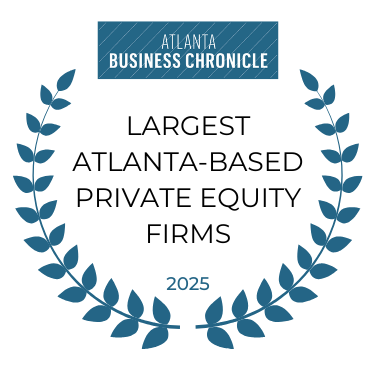Business Owner Resources
We’re committed to providing business owners with the best private equity experience possible. Part of that commitment is assisting founders in equipping themself with the proper tools to enter the selling process informed and prepared.
Founder Options
The choices that shape your selling
experience.

Additional Resources
PARTNERSHIP VIDEO
Watch how these values came to life with our investment in Sailfish Boats.
Choosing a CFO For Your Company's Future
Join us on a deeper dive to an often-overlooked corner of the C-Suite: The Chief Financial Officer.
Why Hire a CFO?
Hiring a financial leader for the organization can be a daunting concept for any business owner. Most entrepreneurs have grown accustomed to wearing many hats (sometimes all the hats). Those founders who have a financial background or education themselves may find it difficult to justify the cost - or perceived lack of control - that comes with letting someone else take the reins of the organization’s financial strategy. Business owners with less financial insight may feel even more insecure about the transition to working with a CFO.
But, as discussed in previous articles, leaders must consider the highest and best use of their own time within the business. By fulfilling all roles at once, the CEO or founder may not only be spread too thin, they may also be working outside their core strengths—and therefore not providing the most value to their customers or the business in any arena. As Ed Watson of New Bridge Consulting Group writes for Nasdaq.com:
“While many CEOs focus on activities such as managing strategy, product management, client acquisitions and cash burn rate, they must also fundraise, manage their investors and their board. The CEOs in many early-stage companies may be doubling as both the CEO and CFO.”
A strong CFO oversees the nuts and bolts of the organization’s finances, as well as helping manage the relationships with investors and the board. The CFO heads up consistent, regular reviews of business activities, with an eye to both profitability and alignment with the company’s current priorities. The CFO provides support and accountability for business units that may be siloed from one another or have not yet adapted to the business’s pace of growth. A strong CFO can support a creative, entrepreneurial CEO while ensuring financial decisions and strategies are tethered to economic reality.
Within the PE environment, the CFO’s role becomes even more critical—as decisions must often be made more quickly and with increased financial accountability to investors.
The CFO in Private Equity Environments: 5 Keys to Success
OBJECTIVITY
In businesses with PE ownership, the CFO is often an “outsider,” someone hired into the role during or as part of the transformation. Unlike internal leaders who have helped grow the business from a seedling, the perspective from outside the business (and often the industry) allows the CFO to view the business objectively. This means she may be able to challenge blind spots, circumvent sacred cows, and ask fresh questions that haven’t occurred to the longtime employees busy keeping the operation afloat.
ENGAGEMENT & PEOPLE LEADERSHIP
Objectivity is important but should never be confused with apathy or emotional distance. According to Ankur Argawal, et al, at McKinsey & Company, the transformational CFO must be able to quickly glean essential information and spot potential leaders. This means developing credibility and trust with the organization’s employees, in order to gather reliable information as well as cultivate buy-in for change. Despite negative stereotypes to the contrary, this undertaking requires genuine caring for the business and its people, high emotional intelligence, and other soft skills.
QUICK ASSESSMENT SKILLS
Financial leaders in PE portfolio companies rarely have time to grow into their roles, or to carefully craft and plan long-term interventions. Whether the company is hemorrhaging cash or gearing up for the next level of growth, the financial strategy has many stakeholders and a pressing sense of urgency. The CFO must be able to quickly assess where the highest-impact, fixable financial issues are, and react quickly.
BIG PICTURE THINKING
The PE environment requires a CFO who can quickly understand the needs and concerns of all the business’s stakeholders: from the CEO to the front-line employees, and from the end-user customers to the high-stakes investors. These perspectives must be taken as a whole to form a full picture of the organization’s current and future finances.
HIGH IMPACT DECISIONS
By quickly assessing the situation and creating big-picture context, the CFO can see opportunities for the business to make changes that have a large, immediate impact on viability and growth. He can also develop sound financial strategies, metrics and measures to improve decision-making all across the company. According to Argawal, et al, at McKinsey & Company:
“The final priority for the new CFO in a PE-owned company is to keep the overall transformation on track. That includes defining key performance indicators and monitoring metrics in ways that are robust but not overwhelming… With a good handle on the finance function and a clear understanding of primary levers for value creation, the CFO can be a challenger and influencer within the portfolio company."
It’s too early to tell how much these new professional priorities will revert when the pandemic crisis passes. It is clear, however, that many aspects of a CFO’s job will be forever changed as more companies make remote working a permanent part of workplace culture.
"When finance executives were asked which important skill they had leveraged because of the coronavirus crisis, the most-cited answer was business strategy, chosen by 34% of the executives, followed by operations management (29%). Data analytics and innovation/entrepreneurship were tied as the third-most-cited top skills drawn on during the pandemic, at 10%."
Finding the Best CFO for Your Organization
As the workforce evolves over the next decade, experts predict workers of all types will need increasing ability to manage cognitive complexity, social and emotional skills, as well as technological savvy. According to the shipping and maritime trade publication, Splash: “Finance professionals with industry-specific soft skills are set to be in demand and in short supply.”
It’s never too soon to start considering what your business needs in this pivotal leadership role, and flexibility around industry knowledge or experience is an advantage. Remember that a CFO with the skills outlined above can quickly learn the industry-specific knowledge needed to support your business; while an industry expert without the critical strategic and leadership skills is unlikely to develop them in time to be useful to your team’s transformation.
SHOULD YOU START WITH A CONTROLLER?
If your business primarily needs leadership over its internal finances, accounting and reporting, a controller may be the logical next step, either before or instead of a CFO. If, however, you need a strategic partner to make financial decisions and interface publicly on behalf of the company, the CFO role may be an essential one. Some businesses need both, others have only one or the other.
COULD A VIRTUAL CFO BE RIGHT FOR YOU?
If your business needs higher-level financial leadership, but you don’t yet have the budget or ability to commit to a full-time executive, a virtual CFO (vCFO) or outsourced executive (CXO) can be an optimal solution.
Virtual CFOs perform many of the duties of a full-time CFO, but on a part-time basis. Like a freelance bookkeeper or accountant, a vCFO serves multiple clients, performing key duties on an as-needed or retainer basis. VCFOs may have long-term relationships with their clients, sustaining them until a full-time hire is needed. Sometimes the vCFO becomes the full-time CFO when the business can sustain the position.
CXO: SHOULD YOU OUTSOURCE?
Like the CFO, an outsourced CXO is not a full-time employee of the business and generally works on a contract basis. Sometimes the executive is recruited by the business or a placement firm, other times they may be installed by agreement with the PE firm or other major investors. The outsourced executives may be virtual or housed within the company, and often work full-time for a certain period of time – during a transition or merger, for example – until a permanent replacement is found.
Georgia Oak can assist with locating operational partners and executives to meet your company’s needs during the transformation and beyond.
At Georgia Oak, we’re committed to enhancing your business and helping founders grow their legacies
to their fullest potential. If you find we’re a good fit for your next step, please reach out to us.



